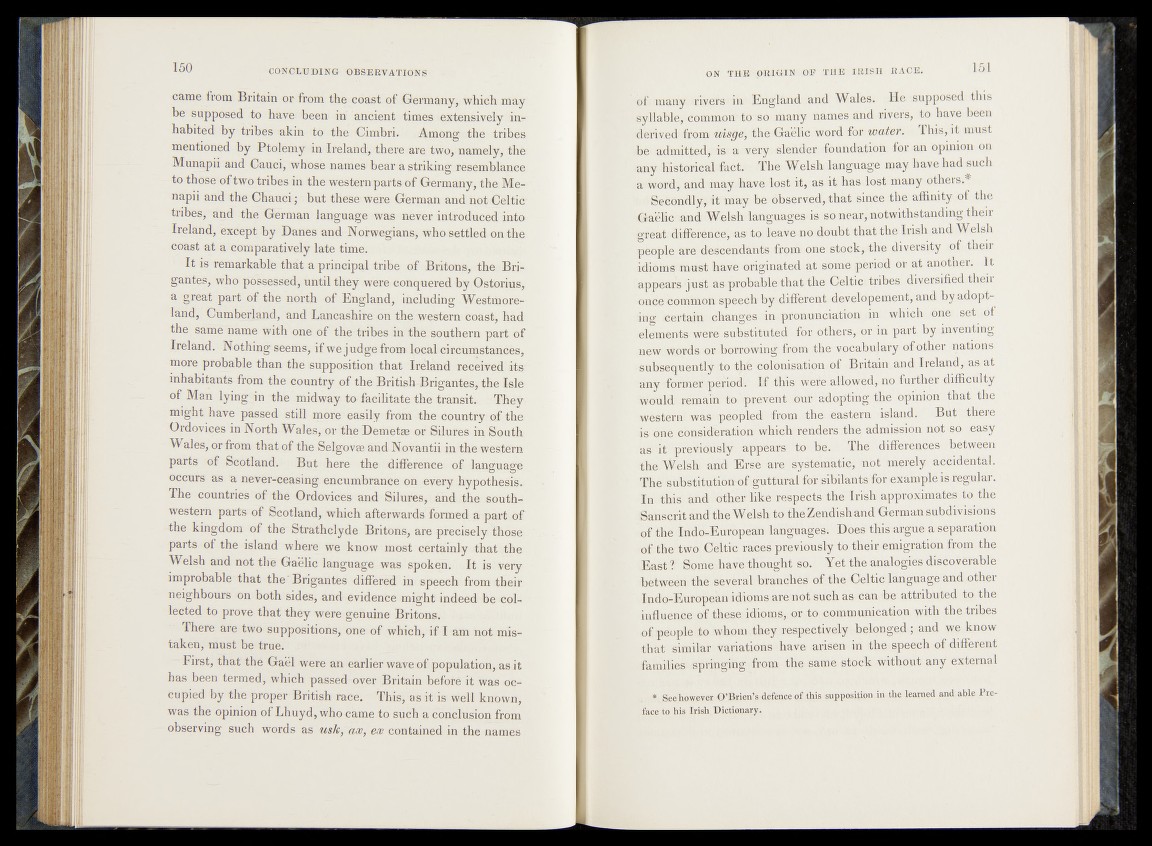
came from Britain or-from the coast of Germany, which may
be supposed to have’ been in ancient times'extensively inhabited
by tribes akin <to the Cimbri. Among the tribes
mentioned by Ptolemy in Ireland, there are two, namely, the
Munapii and Cauci, whose names: bear a striking resemblance
to those of two tribes in the western parts of Germany* the Me“
napii and the Ohauci ; but theHewei® and nofcifieltictribes,
and the German language was never introduced ;into
Ireland, except by Danes and Norwegians, who settled on the
coast at a comparatively late time.
It is remarkable that a principal tribe of Britons, the Bri-
gantes, who possessed, until they were conquered by Ostorius,
a great part of the north of England, including Westitiore-
land, Cumberland, and Lancashire on the western eoast*had
the same name with one of the tribes.in the southern part of
Ireland. Nothing seems* if we judge from local ci>tt#ai@iStahhes,
more probable than the supposition that Ireland received its:
inhabitants from the country of the Briti&h-Brigantes, the Isle
of Man lying in the midway to facilitate the transit. They,
might have passed still more easily from the country of the
Ordoviees in North Wales, or the Demetse or Silufes in South
Wales, or from that of the Selgovas and Novantii in the western
parts of Scotland. But here the difference of language-
occurs as a never-ceasing encumbrance on every hypothesis.
The countries of the Ordoviees and Silufes, and the southwestern
parts of Scotland* which afterwards formed a part of
the kingdom of the Strathclyde Britons, are preciselyljhose
parts of the island where we know most certainly that the
Welsh and not the Gaelic language was spoken. It is j very
improbable that the Brigantes differed in speech from their
neighbours on both sides, and evidence might indeed be collected
to prove that they were genuine Britons.
There are two suppositions, one of which, if I am not mistaken,
must be true. ,
“—First, th a t the Gael were an earlier wave of population, as it
has been termed, which passed over Britain before it was occupied
by the proper British race. This, as it is well known,
was the opinion of Lhuyd, who came to such a conclusion from
observing such words as usky'aw, ^ contained in the names
of, many rivefsi-m' England and Wales. He-.supposed this
syllable^Gemahaip.t®o many names and rivers, to have been
dereved^fromi wisge, thas Gaelic ward dor wetter- This, it must
?be admitted*‘ iss aM«e^«sle^f ¥founda.tion, for an opinion on
cany.historical fafst$ -Th© WebdMamguage. may have had such
a word, and rmay^hav^lost it,asjithas,4©sf:many others*
'jfdSecbndlyf'at masy^-ilbserved^ that sintee the* affinity of the
.Gaeliic^and W e l s h n e a r , notwitbstand mg, their
great diffenenejepas' to^l^^^n‘0'd!@ubt"that the Irish and Welsh
people^are descendants'from? omeM^ock, the their
ididnS^tnust have originated at at anj$f$i)er. It
appears §n&foasprobabledha%t’b ^ i^ l^ c^ tr4h^^div:ersjjfied,th,eir
'onde common speech byidgff^ejn^dqvelopenlent, and jfey adopt-
IcertafU dhB/age®fe', in pBonuaicaa^l0^fi|:if' whlfhfetori^^ ^of
l^ldspenfs were substituted • for Pthey%||| in h y dnve'n< inv.
new wovd^^l^rrowin^frpm^efs-f^^abulary^^lltp^r^nations^
subselpXentlydoHtl®'^^^^ Britain^pvd ;Irelap ^as,at
any fbrjweilpSriotl-: If this’tw^^^^'O^^djpp ffurfcher difficulty
(iroduld remain to prevfeht-dduf adoptingthe bpinjo|i that the
westerns' was |p|l)pl|ed|^'pTn th©„ eastern if^ au d . But there
as one c&#idiration. which renders the-; admj^iQnxiOjt sp,„xeagy
as it previdnSly', appears to Sfee.d: )The> dip&ehces. :bptvfi%dn
the.Welsh and Erse %re;systemati^^t'mierely^acei‘d e u t^
The substitution-of gutturdbfpr sibilants for example is regular.
In-this' and other like respects the Irrehh^pJdxpuates the
^Sanscrit and the Welsh, td theZendish and. German subdivisions
of the Indo-European languages. Does this argue||peparation
of the two? Celtic races preibohsly t&lhieir emigration from t^b
East ?; gdmeihave thought so. Yet the anaMMdk disQoverable
between the several branches of the Celtic language and other
Ipdo-European idioms aretiot such as- can he attributed to the
influence of these idioms, or to opmmunication with the tribes
of people to whom they xespectively hefoHged; and we know
that similar variations have arisen in the speech of different
families springing from the same stock without any external
* however O’Brien’s defence of this supposition in the learned and able Preface
to his Irish „Dictionary.